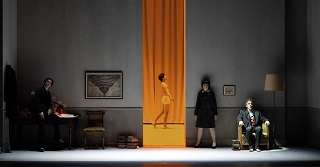|
Back
A Wild, Wagnerian Journey in Italian Aix-en-Provence
Grand Théâtre de Provence
07/08/2022 - & July 13, 15*, 17, 2022
Pascal Dusapin: Il Viaggio, Dante (World Premiere)
Jean-Sébastien Bou (Dante), Evan Hughes (Virgil), Chistel Loetzsch (Young Dante), Jennifer France (Beatrice), Maria Carla Pino Cury (Lucia), Dominique Visse (Voice of the Damned), Giacomo Prestia (Narrator)
Choir of the Opera Lyon, Richard Wilberforce (Choir Director), Orchestra of the Opera Lyon, Kent Nagano (Music Director)
Claus Guth (Director and Choreography), Etienne Pluss (Setting), Gesine Völlm (Costumes), Fabrice Kebour (Lighting), rocafilm (Video), Yvonne Gebauer (Dramaturgy), Thierry Coduys (Electronic acoustics)

(© Monika Rittershaus)
Pascal Dusapin created his new opera Il Viaggio, Dante, for the Aix‑en‑Provence Festival, co‑producing with Opera National of Paris and Saarlandisches State Theater, Saarbrücken and Luxembourg State Theater.
Aix is a home for Dusapin, one of the most important composers of this century. His To Be Sung, premiered in 1992‑3, and got a superb production at the University of Southern California, San Diego. Susan Narucki, a new music soprano and a professor of music at UCSD, was in the original Paris production. She directed this highly successful production of the chamber opera. Yet Dusapin’s work is not often performed in the US.
This new work is absorbing on every level. Dusapin has given us a Dante of rhapsodic lyricism. Jean‑Sébastien Bou compels in the role. The baritone’s repertoire ranges from Gluck to Bizet to Poulenc, Stravinsky and Thierry Escaich. As a beast in Escaich’s first opera Shirine (Lyon), he was electric. His rich baritone is encased in a brilliant acting singer. Amfortas comes to mind, an Amfortas who actually moves to release himself from his dilemma: injured and in pain.
Dusapin has not re‑created The Divine Comedy in a hundred minutes. Instead, he has given us its echo, in story and in music. He does not literally create circles or use other Dante devices. Rather we get an impression. Moments like Virgil (Evan Hughes) dragging Dante through Limbo are exhausting and impressive.
Hughes is an elegant American bass-baritone, a Christ-like figure in Il Viaggio. Hughes is forceful as he leads the author Dante on a difficult journey. In the final tableau, when he asks in curious tones why Dante is still riveted on dark and damaged shadows, we ask the question too.
Italian is the opera’s language because words are central for Dusapin. After mezzo-soprano Christel Loetzsch was cast in his Perelà, he discovered that she had a doctorate in Petrarch, Boccaccio and Dante. Her inherent sense of these words is beautifully expressed as the young Dante.
Dusapin also composed for her two voices, one soft and grave, the other sharp. This offered complex psychological opportunities which Loetzsch maximizes.
The director Claus Guth points out that there are three Dantes in the opera. Dante adult, Dante young man and the narrator. This insight informs the white-sequin-suited narrator, Giacomo Prestia. The narrator is Dante the author. He comments on the journey, looking at seven tableaux, explaining moments and helping us channel them. Dusapin regards him as a solo Greek chorus.
Conductor Kent Nagano brings forth all the orchestral glories of the score. The medium-sized orchestra features the glass harmonica, both crystalline and ethereal. The overall impression is of organic strangeness. Often moments are of great beauty. Others are intentionally ugly. The composer’s first teacher Messiaen can be heard. The growling base textures are the composer’s very own. Unusual percussion instruments look a bit like a Lou Harrison orchestra. Electronics are used to take us to another aural space. Yet the effect is pure. Minimal counterpoint and polyphony are employed.
Dusapin’s artistry is not confined by period style or tonal demands. The tones, rhythms, accents and alliterations reflect the Italian language. Nagano takes us on this musical voyage. It may be strange, but it is also direct and honest. Beatrice is the lovely Jennifer France. Maria Carla Pino Cury completes the principal roles as Lucia. Hers is the vocal line with the widest range, sometimes screeching her lines. The composer passes the Barbara Hannigan test: she sings his music.
Dusapin is an accomplished photographer and his attention appears to be brought to the production. We are immediately transported to a dark, 3D forest in videos. A car driven by Dante has an accident, which precipitates a journey somewhere between life and death. This scene is sometimes superimposed on the study where Dante writes, and Beatrice appears on and off. The ‘brick and mortar’ set is enhanced as it opens to show rows of the damned and the light of heaven which draws Dante on. The Choir of the Lyon Opera, conducted by Richard Wilberforce, performs hymns in each tableau. These are integral and contribute to the feeling, not of an oratorio, but rather of a reverent attention. Messiaen joins us. Il Viaggio, Dante, is innovative and inviting in each of its elements. The composer’s wide ranging interests and freedom to realize his perceptions in music, song and visuals, makes this a unique and inviting.
Susan Hall
|